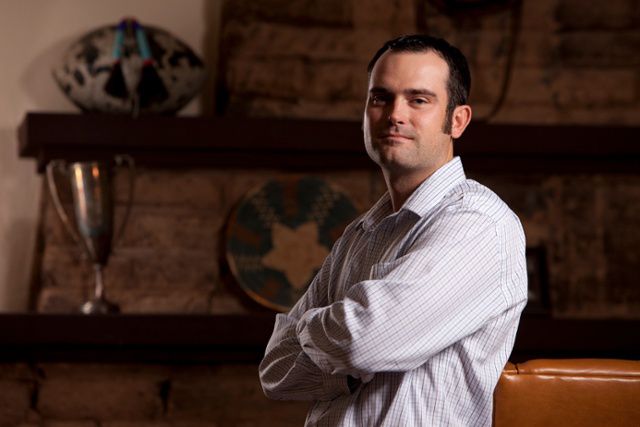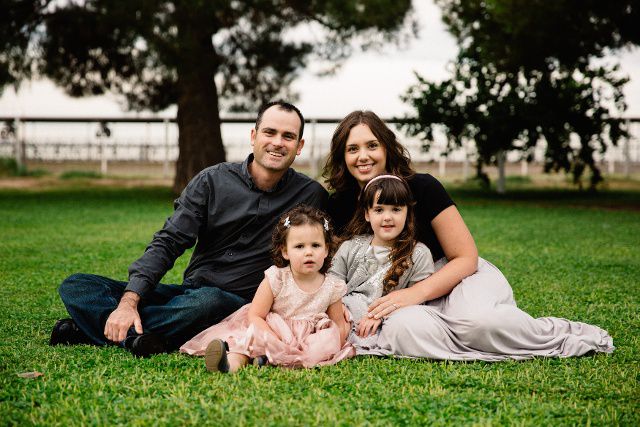Arizona Agriculture’s Conversation with a Farmer Geneticist
Published
3/23/2016
By Julie Murphree, Arizona Farm Bureau Communication Director: Originally published in the March 2016 issue of Arizona Agriculture, we share this amazing conversation with our online audiences … If you’ve ever heard him speak you’d say his enthusiasm was contagious. Yes, contagious even if the topic is about genetics. Buckeye, Arizona Dairyman Wes Kerr of Kerr Dairy shares his passion for genetics -- and
Beyond eliminating the need to dehorn cows with polled genetic success, Kerr contends that we might just be studying the “language of God” when we study DNA strands, amino acids, A, T, C and G sequencing and more. Partly influenced by what his dad said to him years ago as a boy and by Francis S. Collins book, The Language of God, Kerr celebrates that genetics carries for us our special code of life.

While Wes Kerr of Kerr Dairy might be excited about the progress of the polled genetics program on the family dairy, he’s also encouraged by the potential of breeding for specific milk proteins.
And, this farmer under 40 is focused on a bright future for agriculture because of the opportunities today’s technology is affording those in the industry. He’s certainly trying to take advantage of what our modern world is serving up.
He was earlier quoted in Progressive Dairy saying, “My goal is that my grandchildren will never know cows had horns.” To get to 100% polled Holsteins on the family dairy takes times.
So, Arizona Agriculture had a conversation with Wes Kerr to get an update on his polled genetic efforts (including some other efforts with genetics that could impact other areas in the dairy industry) on the farm and find out what else excited this enthusiastic dairy farmer. Oh yes, he insists he’s not a geneticist, but simply loves studying the science behind it.
Arizona Agriculture: We know you know a lot about genetics, certainly polled genetics, but what inspired your interest in it?
Kerr: When I was a kid I remember riding around the dairy farm in the truck with my dad and asking him why almost all of our cows had black and white spots, but a couple had red and white spots. He told me it was due to different genes inside the cow. I was amazed by this so I decided I needed to learn more about genetics. I concluded that if genes were powerful enough to change the color of a cow then what else could they do?
Since that day I have never been bored studying genetics. The more I have learned about the complexity of DNA the more amazing and miraculous I find it. Realizing that ALL life on Earth is made up of only four amino acids that are chained together to spell out a specific code is astounding to me. It doesn’t matter if it is bacteria, fungus, plants, animals or humans we all are made of a complexity of varying sequences: A, T,
Arizona Agriculture: Update us on your polled breeding program so far on the Kerr Dairy? And, what’s the percentage of your heifers now that are polled?
Kerr: Our polled breeding program is going very well. We have continuously selected for the
Arizona Agriculture: Besides your interest in genetics, what motivated your drive to achieve a high percentage of polled heifers in your herd and ultimately for the industry?
Kerr: For
Arizona Agriculture: To have polled cows in the dairy industry certainly should be classified as another identifiable development, if not
Kerr: With any
There have been several exciting developments industry wide in regards to
Every sire summary has more polled bulls available and many dairy farmers now consider polled a viable option for their farm. Polled is no longer considered a fringe idea but it is now, for many, a question of when will we start using it. The dairy industry is moving at a brisk pace towards adopting polled. Polled dairy cattle will one day be the norm.
Arizona Agriculture: What are your plans for the future with your polled genetic development?
Kerr: We will continue to breed for polled, but to
Arizona Agriculture: You’ve also shown a willingness to take a risk, go out on a limb, or buck the trends. Why?
Kerr: I believe that life is precious, fleeting and should be lived to the fullest. Every person has unique talents,
My curiosity and desire to seek truth and understanding
Arizona Agriculture: As a farmer under 40, what do you think is your future? Speak also in terms of your generation in general.
Kerr: I consider myself a long-term optimist but a short-term pessimist. I believe that the future is very bright for agriculture. Our world will continue to need agricultural commodities, and technology will continue to provide new ways of meeting demand. However, there are threatening realities that we must overcome and that is why I am a proud member of the Arizona Farm Bureau. I am positive that together we will overcome these challenges.
My

Arizona Agriculture: Many say the up and comers, like yourself, will have to operate differently than the previous generation. If so, how?
Kerr: We are living in a globalized economy like never before in history. This creates more volatility in world markets than ever before. Our generation must be more sensitive to change in order to stay efficient and profitable in our various operations. It is an exciting but challenging time to live!
Arizona Agriculture: There are also commonalities in each
Kerr: At the end of the day, the way we do things might (or perhaps sometimes should) change, but the reasons we do what we do should not change. For me, it is the “how” that will change, not the “why”. What drives our farm is a deep respect for our land and cattle. We are called to be good stewards of what we have, and that is the core value that must remain from one generation to the next.
Arizona Agriculture: For the non-scientist, genetics is a complex topic, yet when you enthusiastically talk about it and especially as it relates to your own dairy farm, the science of genetics comes to life. One can conclude that the science of agriculture needs to be celebrated more. Give us tips on how to do this.
Kerr: Agriculture at its core is science. Those of us in agriculture deal with living things which is biology. But biology is not the only branch of science that agriculture deals with. We must also understand chemistry, geology, ecology, meteorology and more. The better we understand the various fields of science the more efficient we can make our operations.
Those of us in agriculture are on the frontlines of human interaction with our living world. We agriculturalists bring sustenance (along with other commodities) to the postmodern world which would have never developed into what it is today without efficient food production. The most advanced societies around the world have the lowest percentages of their populations working in food production which frees up the masses to pursue all other aspects of an advanced economy. Poor countries tend to have the majority of their populations in agriculture due to inefficiencies which are passed along to their underperforming economies.
Humanity today is experiencing great advances in almost all areas of life. Very serious challenges still remain, but I believe the overall success around the world is in a large part due to sweeping advancements in agriculture. For this reason, modern agriculture should be celebrated the world over. I believe the future is brighter than it has ever been before in human history.
Arizona Agriculture: Being a dairy farmer and genetics enthusiast, where do we go now with the GMO story on behalf of the public?
Kerr: I believe we need to continue to make it clear to consumers the reasons why the agricultural community has so readily embraced biotechnology. We should share our own reasons as to why biotechnology makes sense for our own operations. Letting the public have
The future for biotechnology is expanding into many areas. Medical biotechnology is having much success in fighting many diseases but perhaps most notably in the fight against cancer. I would like to see those of us in agriculture highlight these successes. Most people want state-of-the-art modern medicine available when it comes to fighting disease, if we can show the public that the same technology that helps us fight disease also helps us solve problems with growing crops then, I believe, we are much closer to bridging the gap